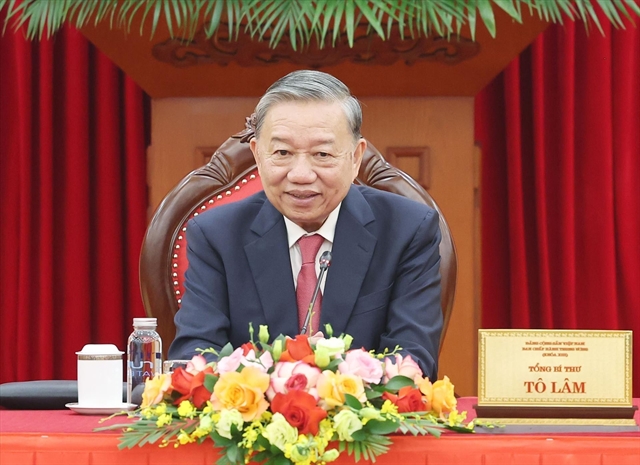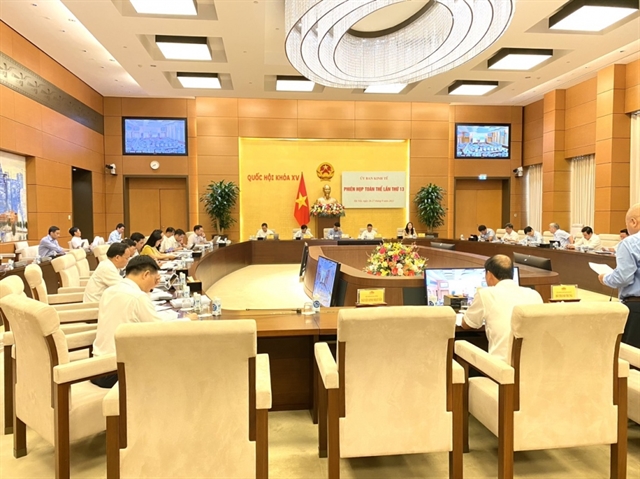 Politics & Law
Politics & Law

 |
| The 13th session on the implementation of the economic and social development plan for 2023 with the National Assembly’s Economic Committee on Wednesday. — Photo courtesy of vov.vn |
HÀ NỘI — The Ministry of Planning and Investment predicted that 2024 will be a year of opportunities and challenges, and the economic outlook will encounter numerous difficulties and hurdles, potentially more than in 2023.
The ministry underscored the importance of resolute measures to expedite the disbursement of public investment capital right from the beginning of 2024, especially for key national projects, infrastructure initiatives and national target programmes.
Speaking at the 13th session on the implementation of the economic and social development plan for 2023 with the National Assembly’s Economic Committee on Wednesday, Deputy Minister Đỗ Thành Trung noted that the socio-economic situation in 2023 continued experiencing gradual and positive changes.
Reports from the ministry showed that the Consumer Price Index gradually recorded an average increase of 3.1 per cent in the first eight months. Interest rates decreased positively, with average deposit and lending rates for new transactions decreasing by about 1.0 per cent compared to the end of 2022.
The domestic foreign exchange market and exchange rates remained relatively stable, maintaining market liquidity and meeting legal foreign exchange demands.
State budget revenues for the first eight months reached 69.4 per cent of the estimated target, with efforts to achieve 100 per cent of the annual target while implementing tax exemptions, reductions, and extensions to support and alleviate difficulties for businesses and people.
Investment in development continued to yield positive results and remained a significant driver of economic growth. Disbursement of public investment capital reached 42.35 per cent of the plan by the end of this August, surpassing the same period in 2022 by nearly VNĐ87 billion (US$3.5 million). Total registered foreign direct investment (FDI) capital for eight months reached $18.15 billion, an 8.2 per cent increase compared to the same period, with actual FDI reaching $13.1 billion, a 1.3 per cent increase.
Business development continued to show positive signs, with more than 149,000 enterprises entering the market in eight months.
However, Trung acknowledged there were still significant difficulties and challenges.
Economic growth in certain quarters fell short of the set targets. Although growth in the later quarters exceeded the previous ones, the gross domestic product (GDP) for the first six months only increased by 3.72 per cent, particularly in the industrial and construction sectors. State budget revenues for eight months decreased by 8.8 per cent compared to the same period last year.
Business activities faced numerous challenges. The domestic market demand contracted, and exports to key markets decreased compared to the previous year. Access to credit remained challenging, credit growth was low, and non-performing loans tended to increase. Real estate and corporate bond markets posed potential risks.
The rate of unemployment and reduced working hours, plus a one-time increase in social insurance withdrawals remained high.
The ministry reported that inadequate monitoring and forecasting of the socio-economic situation, delayed policy responses at certain levels, and missed opportunities for recovery and development were among the main causes.
Ineffective mechanisms and policies, unaddressed legal barriers and reluctance of administrative agencies also contributed to the issue.
Deputy Minister Trung outlined the expected socio-economic development plan for 2024, which comprised 15 key targets following the five-year plan for 2021-2025 approved by the National Assembly.
Specifically, the GDP growth rate was expected to achieve approximately 6-6.5 per cent; the per capita GDP would be around $4,700 - $4,730.
The share of manufacturing and processing industries in GDP must maintain at approximately 24.1 - 24.2 per cent while the average Consumer Price Index (CPI) growth rate would remain at about 4-4.5 per cent.
Trung said the primary goal was to promote growth while simultaneously consolidating and maintaining macroeconomic stability, controlling inflation, and ensuring significant economic balances. There will be a focus on substantial transformations in the implementation of strategic breakthroughs and restructuring of the economy.
Apart from addressing existing limitations to expedite the disbursement of public investment capital, ministries, agencies and localities should enhance mechanisms and policies to streamline and simplify administrative procedures and business regulations to create a more favourable environment and reduce costs for businesses.
Measures will also be taken to resolve difficulties and obstacles in order to achieve sustainable, stable, and healthy development in various markets, especially in the corporate bond and real estate markets, he said. — VNS